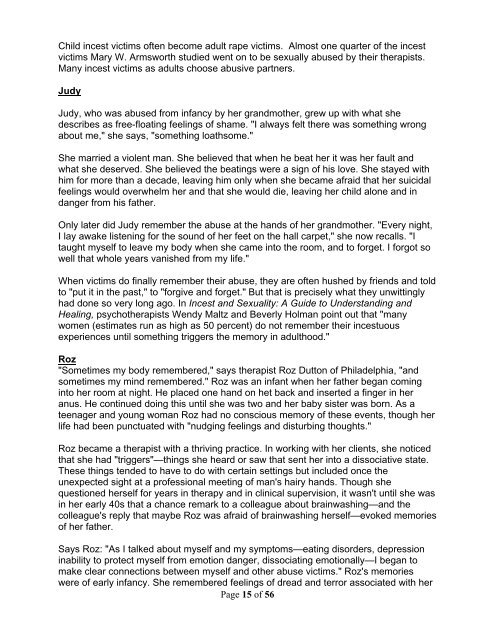Do you want to know what incest is? What it really is? No ...
Do you want to know what incest is? What it really is? No ...
Do you want to know what incest is? What it really is? No ...
You also want an ePaper? Increase the reach of your titles
YUMPU automatically turns print PDFs into web optimized ePapers that Google loves.
Child <strong>incest</strong> victims often become adult rape victims. Almost one quarter of the <strong>incest</strong><br />
victims Mary W. Armsworth studied went on <strong>to</strong> be sexually abused by their therap<strong>is</strong>ts.<br />
Many <strong>incest</strong> victims as adults choose abusive partners.<br />
Judy<br />
Judy, who was abused from infancy by her grandmother, grew up w<strong>it</strong>h <strong>what</strong> she<br />
describes as free-floating feelings of shame. "I always felt there was something wrong<br />
about me," she says, "something loathsome."<br />
She married a violent man. She believed that when he beat her <strong>it</strong> was her fault and<br />
<strong>what</strong> she deserved. She believed the beatings were a sign of h<strong>is</strong> love. She stayed w<strong>it</strong>h<br />
him for more than a decade, leaving him only when she became afraid that her suicidal<br />
feelings would overwhelm her and that she would die, leaving her child alone and in<br />
danger from h<strong>is</strong> father.<br />
Only later did Judy remember the abuse at the hands of her grandmother. "Every night,<br />
I lay awake l<strong>is</strong>tening for the sound of her feet on the hall carpet," she now recalls. "I<br />
taught myself <strong>to</strong> leave my body when she came in<strong>to</strong> the room, and <strong>to</strong> forget. I forgot so<br />
well that whole years van<strong>is</strong>hed from my life."<br />
When victims do finally remember their abuse, they are often hushed by friends and <strong>to</strong>ld<br />
<strong>to</strong> "put <strong>it</strong> in the past," <strong>to</strong> "forgive and forget." But that <strong>is</strong> prec<strong>is</strong>ely <strong>what</strong> they unw<strong>it</strong>tingly<br />
had done so very long ago. In Incest and Sexual<strong>it</strong>y: A Guide <strong>to</strong> Understanding and<br />
Healing, psychotherap<strong>is</strong>ts Wendy Maltz and Beverly Holman point out that "many<br />
women (estimates run as high as 50 percent) do not remember their <strong>incest</strong>uous<br />
experiences until something triggers the memory in adulthood."<br />
Roz<br />
"Sometimes my body remembered," says therap<strong>is</strong>t Roz Dut<strong>to</strong>n of Philadelphia, "and<br />
sometimes my mind remembered." Roz was an infant when her father began coming<br />
in<strong>to</strong> her room at night. He placed one hand on het back and inserted a finger in her<br />
anus. He continued doing th<strong>is</strong> until she was two and her baby s<strong>is</strong>ter was born. As a<br />
teenager and <strong>you</strong>ng woman Roz had no conscious memory of these events, though her<br />
life had been punctuated w<strong>it</strong>h "nudging feelings and d<strong>is</strong>turbing thoughts."<br />
Roz became a therap<strong>is</strong>t w<strong>it</strong>h a thriving practice. In working w<strong>it</strong>h her clients, she noticed<br />
that she had "triggers"—things she heard or saw that sent her in<strong>to</strong> a d<strong>is</strong>sociative state.<br />
These things tended <strong>to</strong> have <strong>to</strong> do w<strong>it</strong>h certain settings but included once the<br />
unexpected sight at a professional meeting of man's hairy hands. Though she<br />
questioned herself for years in therapy and in clinical superv<strong>is</strong>ion, <strong>it</strong> wasn't until she was<br />
in her early 40s that a chance remark <strong>to</strong> a colleague about brainwashing—and the<br />
colleague's reply that maybe Roz was afraid of brainwashing herself—evoked memories<br />
of her father.<br />
Says Roz: "As I talked about myself and my symp<strong>to</strong>ms—eating d<strong>is</strong>orders, depression<br />
inabil<strong>it</strong>y <strong>to</strong> protect myself from emotion danger, d<strong>is</strong>sociating emotionally—I began <strong>to</strong><br />
make clear connections between myself and other abuse victims." Roz's memories<br />
were of early infancy. She remembered feelings of dread and terror associated w<strong>it</strong>h her<br />
Page 15 of 56


